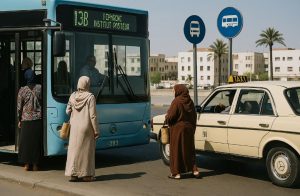When you’re planning a trip to Morocco, the question of language naturally comes up. You might be wondering, “Will I be able to get by with English?” Let’s dive into what you can expect in this vibrant, culturally rich country.
Languages Spoken in Morocco Besides English
Morocco’s linguistic landscape is a fascinating blend. The official languages are Arabic and Berber (Amazigh). In everyday life, most Moroccans speak Darija, a unique Arabic dialect that might sound quite different from what you’ve heard before.
Languages Spoken in Morocco Besides English
French is widely spoken across Morocco due to its history as a French protectorate. In cities like Casablanca, Marrakech, and Rabat, you’ll find that many signs, menus, and official documents are in French. Knowing a bit of French can certainly help you get around more easily.
Where Do People Speak English in Morocco?
English isn’t as widespread as French or Arabic, but it’s gaining ground, especially among younger Moroccans. In tourist hubs, many people working in hotels, restaurants, and shops have a basic grasp of English. Tour guides, in particular, often speak English well, ready to assist the influx of English-speaking visitors.
Here’s a more personal look at what you can expect when navigating Morocco with English:
Real-Life Experiences
- In the Souks of Marrakech: You wander through the bustling souks, the vibrant markets filled with colors, sounds, and scents. Vendors greet you with “Hello, my friend!” as they invite you to look at their wares. Haggling over prices often happens in a mix of English, French, and gestures, making for a lively and engaging experience.
- At a Casablanca Café: You sit down at a cozy café in Casablanca. The menu might be in French, but the friendly waiter speaks enough English to help you order a delicious tagine. Your attempts to say “thank you” in French or Darija bring a smile to their face, and you feel a connection beyond words.
- On the Streets of Fes: Walking through the narrow, winding streets of Fes, you might ask a passerby for directions. Younger Moroccans, especially those in urban areas, are more likely to respond in English, eager to practice their language skills and help a traveler in need.
Tips for Navigating Language Barriers
- Learn a Few Phrases: Simple greetings and phrases in French or Darija can open doors and hearts. Even a small effort to speak the local language is appreciated.
- Use Technology: Translation apps can bridge gaps when words fail. Google Translate can be a handy tool for deciphering menus or having basic conversations.
- Patience and Politeness: These go a long way. If someone doesn’t understand English, a smile and a bit of patience can make all the difference.
- Stick to Tourist Areas: In popular tourist spots, English is more commonly understood. Venturing off the beaten path might require a bit more creativity in communication, but that’s part of the adventure!
- Hire a Local Guide: A guide can offer more than just translation; they can provide insights into Moroccan culture and make your experience richer.
Final Thoughts
While English may not be the dominant language in Morocco, you won’t be lost without it. Major tourist areas are equipped to handle English-speaking visitors, and your journey through Morocco can be enriched by embracing the linguistic diversity. Each interaction, whether in English, French, or Darija, adds to the tapestry of your travel experience. So pack your bags, bring a phrasebook, and get ready to explore this enchanting country!



